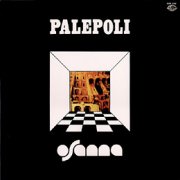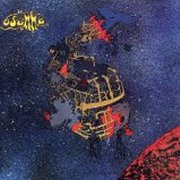




 |
 |
 |
 |
 |
 |
Palepoli (1973, 41.53) ****½/TT½Oro CaldoStanza Città Animale Senza Respiro |
 |
Landscape of Life (1974, 36.15) ***½/TT½Il Castello Dell'esLandscape of Life Two Boys Fog in My Mind Promised Land Fiume Somehow, Somewhere, Sometime |
Current availability:
Mellotrons used:
Osanna are generally regarded as one of the best and most innovative bands to come out of the entire Italian '70s progressive scene. Their debut, 1971's L'Uomo (***½) is good, if not groundbreaking, but their soundtrack to Milano Calibro 9 (****) from a year later is where their reputation begins. Some versions of this album credit 'Mellotron', but after close listening, I can confirm that there's none to be heard; much orchestral string work, but that's it. My copy doesn't even mention Mellotrons.
'73's Palepoli is almost certainly their best work; apparently it's a concept album, or 'rock opera', but without any Italian it's impossible to say. Consisting of two side-long tracks bisected by the under-two minute Stanza Città, the material is highly impressive, its complex instrumental interplay making it a 'difficult', though ultimately rewarding listen. Effectively a continuation of the style of Milano Calibro 9 applied to extended composition, this album is rightly hailed as one of the best of the genre. On the Mellotron front, the only Mellotron to be heard from Lino Vairetti during the first several minutes of Oro Caldo is an understated cello part, but, about seven minutes in, a huge strings part erupts from the speakers in time-honoured fashion, with several other sections throughout the piece. Animale Senza Respiro has a little less, but the quality of the music here overshadows the actual sounds being used, which is as it should be. If only I could say the same for all the bands featured on this site...
My introduction to Osanna was their fourth album, Landscape of Life. Knowing their reputation, I was slightly disappointed when I heard it; don't get me wrong - it's not a bad album, not bad at all, but it's fairly generic and really doesn't stand out from the crowd. Then I found out that their first three are the ones I should be hearing and this is the one where they 'went normal'. Typical. For all that, I like Landscape of Life, it's just that after several plays the really good albums should be starting to 'stick' and this one doesn't. They used their Mellotron (played by both Lino Vairetti and Danilo Rustici) on three tracks, including the final segue of Fiume/Somehow, Somewhere, Sometime. Good use, mostly strings, but nothing particularly outstanding other than some nice pitchbending on the title track. Not a bad album, not a bad Mellotron album, but don't rush out to your corner prog dealer (I know you've got one). Incidentally, I'd advise caution with regard to the reformed late-'70s lineup's Suddance, allegedly featuring Mellotron. It doesn't.
Esteemed Italian progressives Osanna reformed in 1999, the first fruit of their labours being 2001's Taka Boom. A distinctly mixed bag, it doesn't sound an awful lot like their '70s work, shifting between a needlessly updated, slightly fuzak version of L'Uomo, the jazzy prog of Ce Vulesse Ce Vulesse, Oro Caldo and Colpi Di Tosse, the balladry of There Will Be Time and À Zingara and the rocking out attempt of Medley Train. The less said about the poppy title track the better, though... Luca Urciuolo is credited with Mellotron, but I wonder who they're trying to fool? The warbly strings on There Will Be Time and Colpi Di Tosse and flutes on Oro Caldo are the closest it gets, but I don't think so...
It took the band eight years to follow up with Prog Family, credited to Osanna & David Jackson (duh, VdGG), a mostly superb collection of material, genuinely progressive in intent, although not everything here works: Everybody's Gonna See You Die is dull blues-rock, the vaguely funky Solo Uniti doesn't work that well and a run-through of Theme One is spoiled by a shitty organ sound, but overall, it's a triumph. Instrumentally, the playing's as good as you'd expect of these veterans; that's very obviously Jackson's soprano on In Un Vecchio Cieco, amongst his other contributions. Irvin Vairetti is credited with 'Mellotron', although all we get is obviously sampled strings, notably on Il Castello Dell'es. Still, a most worthwhile album, although maybe fifteen minutes lopped from its length, mostly the material towards the end, would actually have improved it.
Osanna's Rosso Rock Live in Japan is, essentially, a 2011 live version of their classic Milano Calibro 9, a handful of studio tracks stuck on the end. The original album's nigh-on faultless, of course, the original dating from their early '70s peak, the band aided and abetted by the Tokyo Vielle Ensemble, who do a superb job of supporting the band, without slipping into any light orchestral flourishes. The three studio tracks from 2012 are decent enough, but seem to be here chiefly to pad the disc out to a reasonable length. Irvin Vairetti (Lino's son?) is credited with Mellotron, but although Sasà Priore's Hammond B3 is pictured... no Mellotron. Big surprise. What's more, whatever it's supposed to be doing, it's entirely inaudible.
2015's Palepolitana is an odd release: a new album, clearly with some connection to Palepoli (damn my lack of Italian!), packaged with a re-recording of said album by the current lineup. The new album's very good indeed, especially by the standards of modern prog, if not quite up to the original band's work, highlights including the storming title track, the beautiful Canzone Amara (I'm sure this is based on a classical piece) and closer Profugo. Little samplotron, with chordal strings on Santa Lucia and Ciao Napoli and flutes on Profugo. Disc two is, of course, familiar territory, but, when the old is played back-to-back with the new, the quality difference is highlighted. The new composition's good, but the old is superb. Samplotron strings and flutes as the Mellotron on the original, although I'll admit I haven't exactly done a second-by-second comparison.
The new Osanna seem to be on a roll at this point; the following year's Pape Satàn Aleppe is a half-studio, half-live release, the studio material proving that Palepolitana wasn't a fluke. Highlights include the title track, Michelemmà and Antotrain, while the live half (from Anni Di Piombo on) gives us selections from the previous year's triumph, a couple of oldies and a few unrecorded pieces, although I think we could've done without Fuje Blues. Samplotron on studio and live tracks, with particularly heavy use on Ciao Napoli.